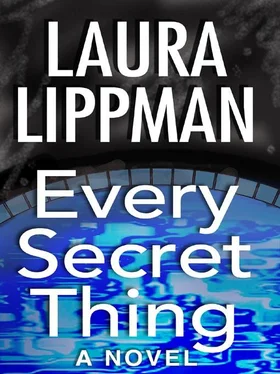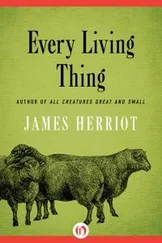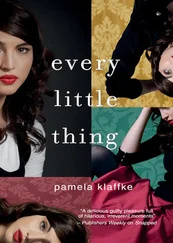“I’m really sorry about Ronnie Fuller,” she said, and the sentiment was as true as she could make it. She did pity the girl’s mother, who looked so wrecked on the evening news, the very embodiment of whatever the opposite of closure was. Even Helen Manning had seemed genuinely grief-stricken by the news of Ronnie’s death, belying a level of feeling that surprised Cynthia. She hadn’t thought the woman was capable of caring for anyone but herself.
Still, Ronnie Fuller would forever be the person who had killed Olivia, and Cynthia just could not be unhappy that the girl had taken leave of this planet.
“If you ask me, what’s galling is that the other girl’s not even in that much trouble. But the justice system is imperfect. Or so they kept telling me, when it failed me.”
“Alice was in a good position to make a deal,” Nancy said on a sigh. “Her accomplice is gone, probably out of the country, so he becomes the perfect fall guy. All of a sudden, this guy she was touting as the love of her life is a predator who raped her in the tool shed while she was supposed to be gardening. I can’t criticize the state’s attorney for not wanting to take it before a jury. A jury might have acquitted. At least she’s on probation this way.”
“Sharon Kerpelman rides again. She must be very proud of herself.”
Nancy allowed herself a wisp of a smile. “She might be, if she hadn’t sold her soul to Rosario Bustamante. I just saw her at the courthouse this morning. She’s working her ass off, representing real scum now.”
“Are you saying Alice Manning wasn’t scum?”
“She is to you. In the big picture, she’s an amateur. I’ve been in interview rooms with some truly scary characters. Alice Manning wasn’t one of them.” Nancy paused, distracted by her own thoughts.
“What about Helen Manning? If she hadn’t told her daughter that stupid story to excuse her own actions…” Cynthia might not mourn Ronnie Fuller, but she still had a hard time speaking of the girl’s suicide. “She’s the one who set everything in motion, with her lies. How does she go on?”
“She goes on because she doesn’t see it that way, because she truly believes she was always well intentioned. Helen Manning is a woman inclined to think well of herself.”
“Aren’t most of us?”
“Not to that extent.”
Cynthia noticed that Nancy had placed one hand on her belly, round and full beneath her straight navy blue skirt, a summery polished cotton that was wrong for the season.
“Are you-?” she asked.
Nancy followed Cynthia’s gaze. “Oh. No, just indigestion from the pizza I ate for lunch. I’m not pregnant.” She smiled. “Not yet.”
“Trying?”
“Sort of. No longer not trying at any rate.”
“Isn’t it hard?”
Nancy laughed. “Actually, I like my husband, so I’m enjoying it.”
“No, I mean-won’t it be difficult to be a homicide detective with a child?”
“Impossible, probably.”
“Even if you could work out the day care and the hours-well, I think it would drive you crazy, knowing the things you know about people, then bringing a child into this world. I don’t know how you could do it.”
“How did you do it,” Nancy asked, “knowing what you knew?”
Cynthia wanted to assume that Nancy was alluding to Olivia’s death, the precarious state of happiness, the folly of bringing another child into this world after losing the first. But the detective could just as well have been referring to what Cynthia knew about herself.
“Look, I have a dentist’s appointment. Was there something specific you wanted from me?”
“Just to touch base,” Nancy said. “I mean, in a weird way I am grateful to you. Given Alice’s past, she might have hurt that child once she realized it wasn’t hers. I’m glad we found her when we did. It’s just too bad that Ronnie Fuller had to be dragged into it.”
“Am I supposed to feel guilty?”
Nancy thought about this. “No. Actually-no.”
And Cynthia realized that Nancy Porter was one of those odd people who said precisely what she meant most of the time. She had not come here to taunt her, or to punish her, or even to transfer to Cynthia any guilt she might feel over Ronnie’s death. She had come here to make clear that no one had fooled her, but also to offer a benediction of sorts. Contemplating motherhood, she understood. Almost.
The girl left, walking on chunky, out-of-style heels with the over-careful tread people used in cemeteries. Once she got pregnant, she was going to be one of those women who just lost it, whose bodies gave in and never found their way back from the world of elastic waistbands. But she wouldn’t mind, Cynthia had a feeling. She’d be so happy, she wouldn’t mind the extra pounds.
Alone at last, Cynthia said good-bye to her daughter properly, then spent a few minutes talking to God. She started out obedient and humble, but she soon found she was giving him all sorts of instructions, running through a litany of what she would accept and what she would not. Some habits were hard to break. But she promised God that she would trust him, from now on, to figure out what was right and wrong. God and men such as her father, imperfect as they may be. She had thought that justice was a salve, something she could create and apply to her own wounds. It had only made her rawer.
Later that day, driving home from the dentist, she went by way of Nottingham, another habit she couldn’t seem to break. She couldn’t help keeping an eye out for Alice Manning. Without even trying, Cynthia had begun to learn bits and pieces of the girl’s routine, and she knew Alice could often be seen this time of day, returning from the bus stop on Edmondson Avenue, plodding along with that distinctive, turned-out tread.
Yes, there she was, coming down the street with a knapsack on her back, a blue plastic grocery bag in her hand, swinging it the way a child might swing her lunch box. The girl was fatter than ever and she had dyed her blond hair red, presumably so she wouldn’t be recognized at the community college she attended. Yet she had also given an interview to that reporter, Mira Jenkins, just this week, and posed for a big photograph. So anyone who cared knew her hair was red now. Mira had called Cynthia and asked if she had any comment she wanted to make. “I don’t talk to reporters,” Cynthia reminded the girl, who was too full of her own good fortune to get the sly joke. She was working downtown, she told Cynthia. She was covering juvenile justice, a beat created just for her.
“Juvenile justice.” Cynthia had longed to ask Mira, Is that a smaller form of justice, the way a Whopper Jr. is just a smaller version of the Whopper? But she had held her tongue.
At least Alice had the good sense not to smile in the photograph, to look somber and grave, her hands folded on the back of a chair that camouflaged her bulk. She was sorry, she told Mira and her readers. Sorry for everything. But she had always been so easily persuaded by others. First by Ronnie, then by Rodrigo. She would try to be stronger in the future. She would be her own person, not so worried about pleasing others. All she wanted, she said, was to be good and do well in school. She was thinking about a career in nursing, or maybe as a teacher, like her mother. Just like her mother. Lord help her, Cynthia thought, if that wish came true. The last thing the world needed was two oblivious Manning women, wreaking havoc on anyone who had the bad luck to get close to them.
“Who that?” Rosalind had asked, coming upon Cynthia as she stared numbly at the paper that autumn morning, poking at Alice Manning’s face with her stubby baby finger. “Who that lady?”
Heads together, mother and daughter studied the photograph. Words occurred to Cynthia, factual but inadequate. To speak the girl’s name, to tell the story, would give her the power she had always craved, to buy into the very happily-ever-after fairy tale that Helen Manning had used to console herself and her daughter. Does Sleeping Beauty’s father ever mention the bad fairy once the spell is broken, much less concede his own hubris? Does the miller’s daughter acknowledge that Rumpelstiltskin made her a queen, fair and square, and that she was the one who reneged on the bargain? Say his name and he tears himself in half. Say the name and be done with it.
Читать дальше












